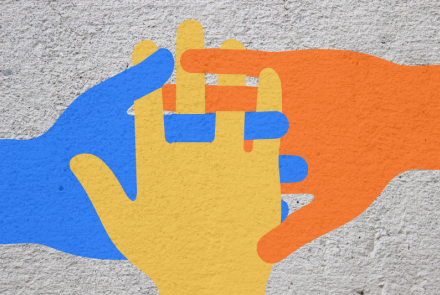
Image by Connie Hagel
COVID-19, climate change, and crisis: does our policy weave threads that unite or divide us?
COVID-19 reminds us just how many threads weave through the world we have created, connecting our health to our mobility to our social wellbeing to our economic security… If we pull on the thread in one place we feel the impacts right across our complex, interconnected system, Dr Bec Colvin writes.
Those threads are best understood as threads of us: dependencies we have on each other and responsibilities to one another. Our policy choices shape the way in which these social threads connect us through competition or cooperation, through hostility or togetherness. COVID-19 has provided an insight into the different types of threads we have woven, and how well they support us in times of crisis.
In the midst of our pandemic fear, illness, and uncertainty, the threads that gave us cause for hope surfaced in the mutual aid networks, the people connecting with their neighbours and community, the new users of local greenspace, the help offered by so many to those in need. The threads were the hands that reached out and found new ways to hold on and stand together through stress and pain. These were the threads of cooperation and togetherness.
But the threads that let us down were those of competition and hostility. The media reporting that amplified racial prejudice, division, and blame. The struggle of the workers whose cruel precariousness showed that doing all in your power to work hard and long does not guarantee a roof over your head when the world hits a crisis. The double standard of sacrifices made by the many but disregarded by a powerful few. These are the same threads that climate change exposes to us. We saw them during Australia’s horror summer of 2019-2020. Another recent crisis that showed the seemingly infinite capacity for human care and support, juxtaposed against deceit, division and opportunism. If nothing changes, we will continue to see these threads time after time as we charge toward a climate changed future.
But, it is within our power to change. We can unpick the threads of competition and hostility and replace them with new threads of cooperation and togetherness. Here, it is critical that we look to our policy priorities and ask whether they are creating the structures that enable us to weave the threads we so desperately need, those of cooperation and togetherness.
This is the point of intersection between COVID-19 and climate change that I think is so critical. The threat of global warming demands societal change that is by its scale and significance outside of the scope of influence of any well-meaning individual. But to enable such broad societal change in turn demands that those threads that weave through our world are threads of cooperation and togetherness. COVID-19 has shown that this is a necessity for human flourishing and social wellbeing, too, regardless of the threat of a climate changed future.
So, the cure and the path to the cure and one and the same. For those of us working in the policy space - as researchers, practitioners, advocates, or other influential actors - we should consider how the policy structures we create buttress or erode the threads of cooperation and togetherness. For example, in climate policy, it is essential that we consider the social relations that surround any potential technical solution for emissions reductions. (I wrote a little more on this for New Matilda, reflecting specifically on the toilet paper panic-buying phenomenon, which now in August 2020 seems a lifetime ago.)
We can look to the narratives that leverage on ‘common sense’ understandings of the world to point to policy solutions, and query whether these are narratives we should be acting to amplify or disrupt. For example, does focusing on our ‘carbon footprint’ inspire us to work together, or make us feel like we’re shouldering the world’s problems on our own? Does financial support to some sectors, and not others, encourage us to think of ourselves as a ‘cooperative we’, or a ‘competitive us and them’?
When the stakes are high on a problem that demands an urgent response, it’s difficult to justify thinking about the long game. But the demands of rethreading our social world such that we are linked by cooperation and togetherness rather than competition and hostility mean that we need to think about the world we want to have, and what it takes to get there.
We in the policy space can start by carefully interrogating what is coded into the narratives and structures of policy we design, advocate for, and implement. An explicitly normative view on social good with attentiveness to the influence of rhetorical techniques and underlying values is a good place to start. If something positive is to come out of all the horror wrought by COVID-19, hopefully it will be the prompt to reimagine the norms of our social relations that we promote via our policy structures and narratives.
Updated: 25 July 2024/Responsible Officer: Crawford Engagement/Page Contact: CAP Web Team













